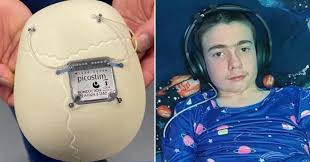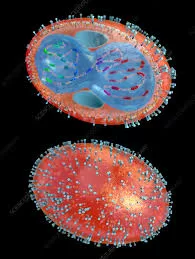In a medical milestone, a UK teenager with severe epilepsy has become the first person worldwide to be fitted with a revolutionary brain implant designed to control seizures. Thirteen-year-old Oran Knowlson from Somerset underwent this pioneering procedure in October as part of a clinical trial at Great Ormond Street Hospital (GOSH) in London, in collaboration with University College London, King’s College Hospital, and the University of Oxford.
Oran, who has Lennox-Gastaut syndrome—a treatment-resistant form of epilepsy—experienced severe seizures from the age of three. Before the implant, Oran suffered from daily seizures, sometimes numbering in the hundreds, which frequently led to loss of consciousness and required resuscitation.
The device, known as the Picostim neurostimulator, was developed by UK-based company Amber Therapeutics. It works by sending electrical signals deep into the brain to disrupt the pathways that allow seizures to take hold. The surgery involved the precise placement of two electrodes into Oran’s thalamus, a crucial brain hub, and the connection of these electrodes to the neurostimulator, which was securely positioned under his skull.
Martin Tisdall, the consultant paediatric neurosurgeon who led the surgical team at GOSH, expressed his delight at the procedure’s success. “For Oran and his family, epilepsy completely changed their lives, and to see him riding a horse and regaining his independence is absolutely astounding. We couldn’t be happier to be part of their journey,” Tisdall said.
Since the surgery, Oran’s seizures have decreased by 80%, significantly improving his quality of life. His mother, Justine, noted the positive changes in her son’s demeanor and daily activities. “He’s a lot more chatty, he’s more engaged. He’s turned 13 and I definitely now have a teenager—he’s happy to tell me no. But that adds to his quality of life when he can express himself better,” she said. “The future looks hopeful, which I wouldn’t have dreamed of saying six months ago.”
Oran’s case marks the beginning of the Children’s Adaptive Deep Brain Stimulation for Epilepsy Trial (CADET), which will soon recruit three additional patients with Lennox-Gastaut syndrome, aiming to eventually include 22 participants in a full-scale trial.
Tisdall highlighted the profound impact of this advancement: “Every single day, we see the life-threatening and life-limiting impacts of uncontrollable epilepsy. It can make school, hobbies, or even just watching a favourite TV show utterly impossible. Deep brain stimulation brings us closer than ever before to stopping epileptic seizures for patients who have very limited effective treatment options. We are excited to build the evidence base to demonstrate the ability of deep brain stimulation to treat paediatric epilepsy and hope in years to come it will be a standard treatment we can offer.”
As the trial progresses, the medical community remains hopeful that this innovative approach will offer a new lifeline to children suffering from severe epilepsy, providing them with the opportunity for a better, seizure-free life.












